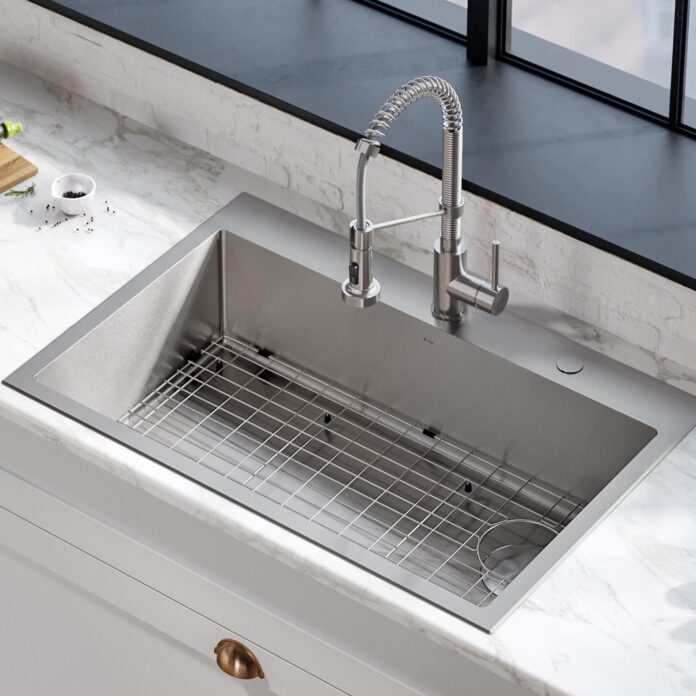Maintaining the attractive look of the stainless steel sink requires constant monitoring. The beauty and appeal of stainless steel relate to good looks and long-lasting maintenance. If you are serious about retaining the original new look of your washbasin, you have to get serious about care and maintenance. Follow a few simple tricks for cleaning stainless steel sinks so that the structure stays the same for a long time.
Some areas of caution
Two areas that require proper attention are corrosion resistance and aesthetic consideration. Routine cleaning of stainless steel sink is necessary for preserving the integrity and appearance of the sink surface. You can clean stainless sinks by employing different methods. Unlike other materials that give away regular wear and tear, they thrive on constant cleaning. However, you don’t require professional handling to get a desirable outcome. Your basic maintenance effort will help you with a sparkling clean stainless steel sink.
Most detergents and soaps contain chloride that harms stainless steel sinks. Hence, rinsing the sink after every use is ideal. Apart from this, you must be cautious of the following points:
The gentle cleaners available in the market are typical for household cleaning. They are easy to use and go well with sponges, warm water, and clean cloth.
- Combine weekly cleaning with simple regular treatment and use soft abrasive cleaners.
- When scrubbing the sink, always work in the direction of polish lines. It ensures that the effort blends with the pattern of the surface. Hence, do ensure there are no scratch marks after the washing is over.
- Since detergents and soaps contain chloride, after cleaning the sink, rinse it immediately. It will prevent corrosion and thereby leave behind stunning results. You may use hot water for rinsing the sink to make it germ-free, shiny and already for subsequent use.
- Ordinary steel wool or carbon steel brush is not decent for cleaning these sinks. The iron particles are left behind, further leading to corrosion and rust.
- After the cleaning process is over, wiping the surface is ideal so that there is no water spots left behind. You may use a soft piece of cloth to avoid water spots. Avoid using oily rags and greasy clothes when working on the surface. Regular drying can work wonders and prevent surface rust and watermarks.
Want to create some extra sparkle?
Almost every homeowner desires a sparkling clean and rust sink. If you want the same results, you must take some essential steps.
Take a look at what experts say:
- Club soda is very effective in providing extra sparkle. When you place the stopper in the sink, pour club soda and rub with the help of a soft cloth. Like always, you must dry the sink with a soft cloth to prevent water spots and rust.
- Baking soda is another magic ingredient for stainless steel sinks. If you want cleaner and shiny sinks, all you need to do is scrub a tiny amount of baking soda with vinegar on the entire surface. It helps prevent grease and food particles and keeps the sink scratch-free. You may use a paste of water and baking soda and rub that on the entire surface to keep it glistening. After doing so, rinse the sink with water after observing fizz and bubbles. Using vinegar for rinsing the sink is another Ingredient that helps remove water stains thereby keeping it sparkling clean.
- After cleaning and drying the sink, you may add extra shine by applying olive oil with the help of a soft cloth. Never use too much oil, as that will leave the sink greasy.
Along with the do’s, you must be aware of the don’ts. These are some of the critical points you must keep in mind for the regular maintenance of your stainless steel sink. Apart from this, you may take the help of the internet for some cleaning hacks that are going viral.
Things you must avoid while cleaning the sink
Never allow sponges, soap cleansers, rags, and towels to dry on the surface when cleaning the sink. All they will do is dull the sink surface below them and harbor bacteria. Along with this, rinsing the sink with chloride every day will affect the natural luster of a stylish Kraus stainless wash bowl, and that will make the sink look cloudy and old.
- Never use wool pads for cleaning stainless steel sinks. It’s because the iron particles of the pad will leave behind corrosion and rust.
- Never use hard surface pads like when cleaning the sink. It will leave scratches on the sink, and you might require extra effort to do away with that. Sometimes it just doesn’t go.
- Never leave cast iron and steel cookware in the sink for a long time. The moisture and iron on the surface may lead to staining and rust.
- Wet sponges, dish mats, and cleaning pad are a complete no-no. If they stay in the sink for a long time, they will trap the water leading to staining and discoloration.
Along with this, try to avoid using cutting boards to clean the dishes or using the sink as the cutting board. Sharp instruments like knives damage the sink surface and call for replacement soon.
Regular drying of the sink works wonders and prevents surface rust and watermarks. For keeping the fabulous and attractive look of the sink, you have to work quickly and with light hands. Cleaning regularly is essential for the proper maintenance of stainless steel. Regular wear and tear affects the material undoubtedly. However, cleaning it with detergents and soap is never an option. Always dry the sink after use to prevent watermarks and moisture build-up.
There are many compound cleaners or blended cleaners available in the market. Never go to such options because it only negatively affects the stainless steel material and is not good for your sink.
In case of broken and damaged sinks, you may grab the help of professionals. They can assist you in the planning and execution of the kitchen layout. Also, the sink installation is a tricky job. It needs professional management. Therefore, get in touch with them and transform your kitchen.





